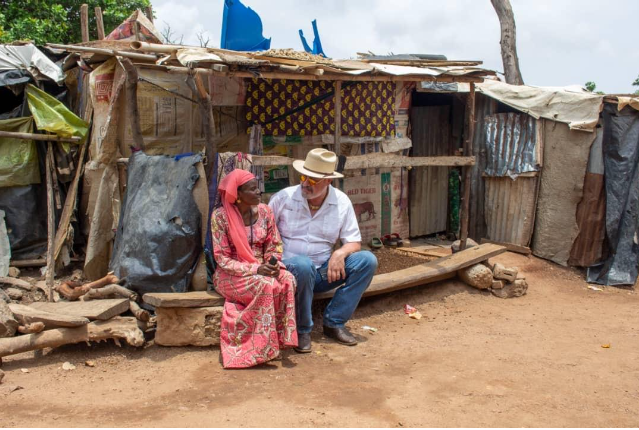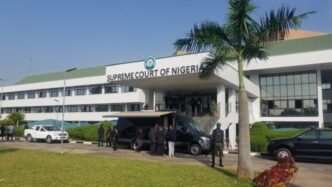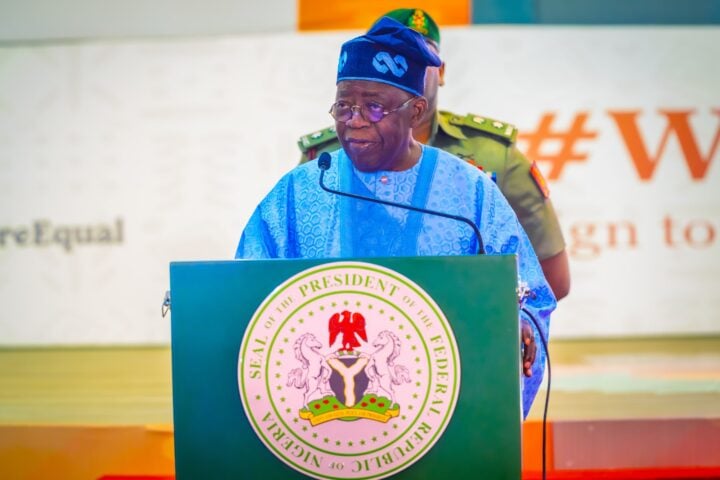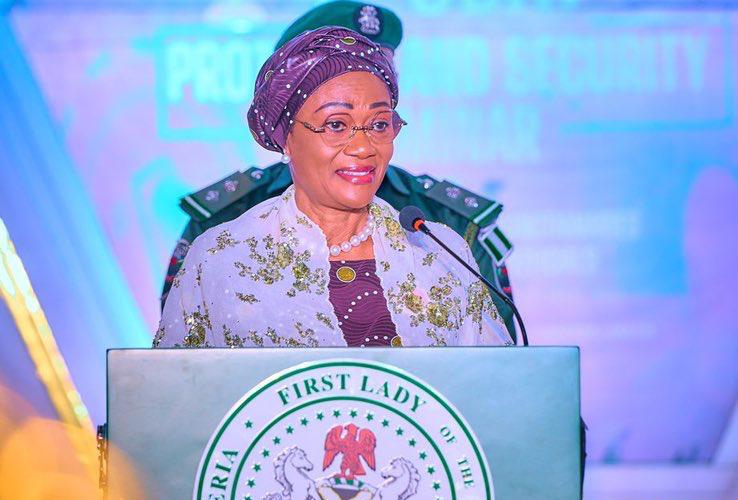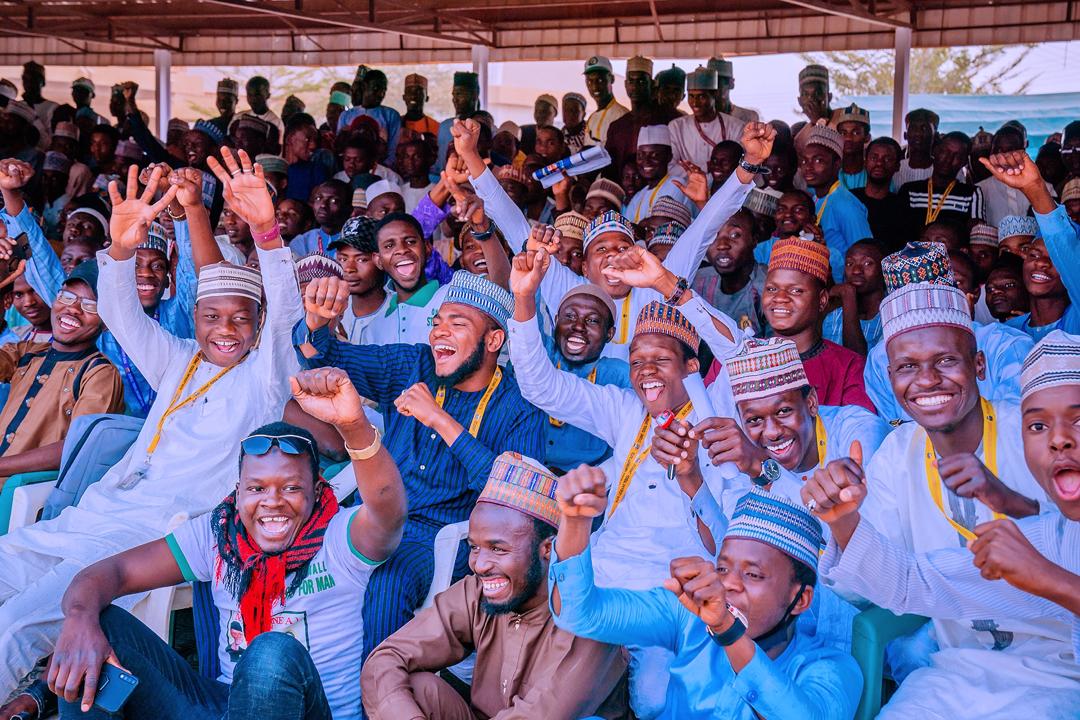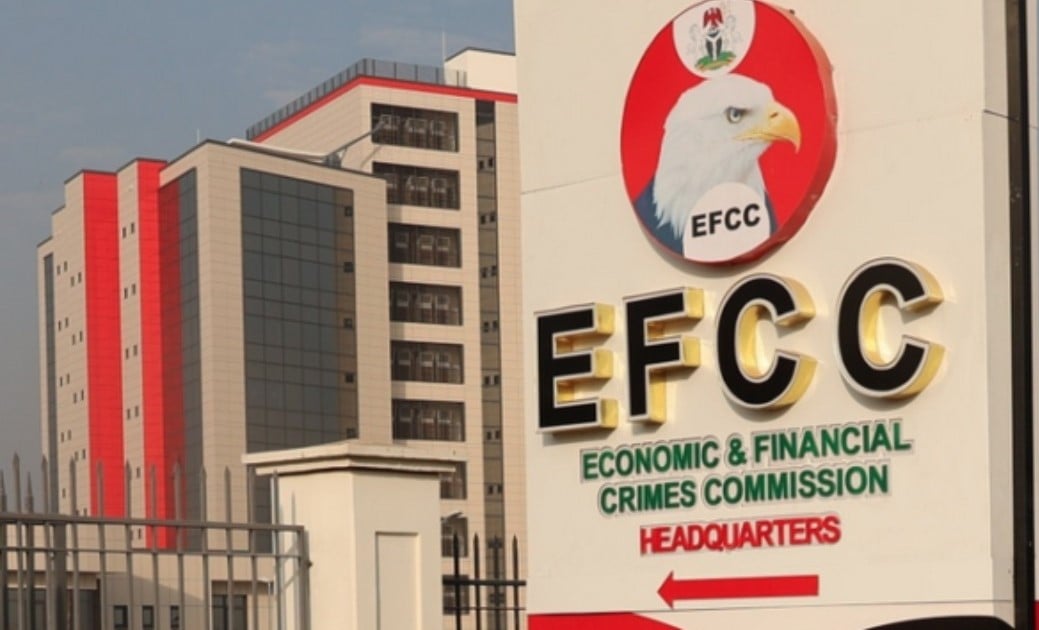BY MIKE ARNOLD
Prior to the Gwoza Massacre in the summer of 2014, Hanatu Ango was the principal of a local primary school. Her story of escape from Boko Haram and survival with her three young daughters is shockingly traumatic.
After witnessing the slaughter of loved ones, being pursued by bloodthirsty jihadis and herded around with a multitude running for their lives, they and thousands of others eventually found their way to Abuja, about 450 miles southwest of her lifelong home in north-east Borno state.
Hanatu said when they first drove into Abuja, in a van stuffed with other survivors and all their worldly possessions, she told her daughters they were going to be okay. Surrounded by a metropolis and wealth they’d never imagined, it appeared they’d made it nearly to heaven.
Advertisement
But then, near the centre of this booming federal capital territory, the van pulled off the highway, down a short dirt track, to the New Kuchingoro encampment, where she was told they had to stay. Seeing the squalid rows of makeshift shanties alongside a sewage ditch, her heart sank. The final sting came when she was told she had to scrounge materials and build her own hovel.
Ten years later, Hanatu still lives in that same shanty next to the sewage ditch, not far off the highway near downtown Abuja, scratching out a harsh and meagre existence along with a thousand or so other internally displaced persons (IDPs) from Gwoza.
Today she is head teacher at a school in camp, fully supported by Africa Arise International, which provides free education to some 320 IDP children, all of whom were born in New Kuchingoro. Hanatu was recently offered a government teaching job, which would have enabled her to move, but she turned it down. She said she wouldn’t leave camp till the last child had gone home.
Advertisement
Other than this school, and occasional help from missionaries, churches and small aid groups, the residents of New Kunchingoro live with zero outside assistance, not even from the government.
Nigeria is gradually emerging from eight years of oppression under the radical and corrupt regime of President Muhammadu Buhari, who benefited from this crisis. Under him, Nigeria became the number one nation on earth for Christian genocide, by far, and home to anywhere from two and a half to nine million IDPs (depending on who you believe).
In Abuja alone, there are as many as 22 encampments like New Kuchingoro, housing some 30,000 displaced people. Completely uprooted from everything they’d ever had or known, fighting sickness and starvation daily, it’s nearly impossible to get traction or a lucky break to rebuild a successful life. Very few IDPs have made it out of these camps alive. Nobody knows the statistics because it’s been swept under the rug for nearly a decade.
Over the years, criminal elements have taken advantage of the fact police won’t set foot in the camps. Girls disappear and nobody investigates. Drug dealers and prostitutes have invaded fringe areas of some camps. Combined with the lack of all basic necessities of life – food, shelter, water, healthcare, sanitation – the lives of these IDPs are hellish, ravaged by continual trauma, sickness, hunger and predatory criminals.
Advertisement
The “powers that be” – including the Nigerian government, UN and other international agencies and NGOs – run some formal IDP camps in the north. I asked several New Kunchingoro residents why they didn’t move there. All said the same thing: They have been told, and certainly believe, that to ever leave those camps, they’d be required to convert to Islam. They’d rather be stuck in subhuman conditions forever than do that.
These people are not IDPs by choice, nor due to personal mistakes or character flaws. They had real lives – jobs, homes, farms, businesses, schools, churches, families, communities – which were violently ripped away. They all want simply to go back home.
Three primary forces keep these IDPs oppressed, as more are slaughtered and displaced to this day: To blame is a devious mix of radical Islam, greed, and political ambition – empowered by corruption and fueled by militant tribalism.
While most of the persecuted are Christian, we’ve found IDP camps populated by peaceful Muslims. To categorise this as a Christian genocide is true but does not tell the full story. Rather, it’s a genocide encouraged and empowered by radical Islam, in which anyone who does not subscribe to their bloodthirsty creed is expendable.
Advertisement
Where populations are displaced, observers say the next thing that happens is wholesale strip mining. I personally saw this in Bokkos, Plateau state, after the recent Christmas massacre which claimed some 300 lives. Vast fortunes of everything from tin to lithium to gold are ripped from the ground and sold around the world. While the greedy traders behind this looting of the land may or may not be orchestrating the attacks, they are known to pay off local military and law enforcement officials to look the other way when it happens.
Jihadis are re-settled into the conquered communities, and each given multiple wives, to ensure steady population growth … and a secure voting block for generations.
Advertisement
It’s a vast, ongoing humanitarian crisis, yet there are many bright points of light piercing this darkness … a multitude of amazing people, like Hanatu, driven by their Christian faith, who have dedicated their lives to serving IDPs, providing education and basic needs, seeking justice, and spreading faith, hope and love.
Nigeria is an amazing nation, full of vibrant people and vast natural resources, with enormous potential. They have an encouraging, new presidential administration, and things are looking up. Yet this IDP issue is the anchor ultimately keeping them from achieving greatness. It sits at the nexus of the forces that have long held them back: Foreign meddling, greed, corruption, merciless political striving, toxic tribalism, and radical Islam.
Advertisement
The Nigerian government can fix this. I hope the new administration of President Bola TInubu has the courage to seize upon this righteous cause and see it through to completion. If they can deal with this issue head-on, they can do anything.
A great nation must be built on a foundation of justice. No other reform or public initiative they undertake will have real meaning or impact until IDPs are restored.
Advertisement
When they do, they will earn the trust of their people and respect of the world, see their economy boom as never before, and finally put Nigeria on track to emerge as a legitimate global powerhouse.
And more importantly to many, Hanatu and her daughters, and all the others, will finally be able to go home in peace.
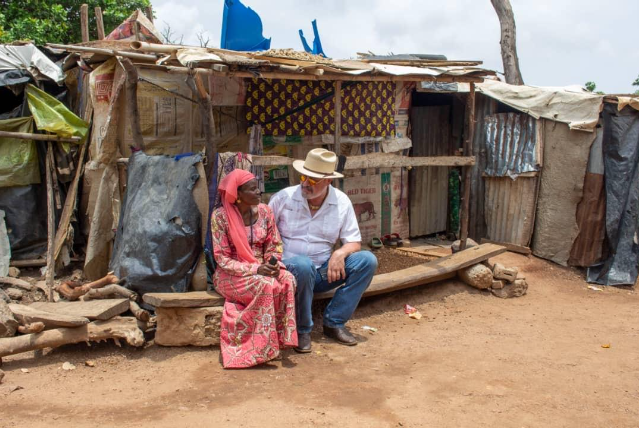
An action plan for meaningful change
Nigerians are known for no-nonsense resolution of urgent matters. Consider the nation’s quick and effective response to the 2014 Ebola outbreak, which garnered international praise.
Today’s ongoing violence and the resulting crisis of millions of internally displaced people (IDPs) are more devastating to Nigeria’s peace, prosperity and international prestige than a full-blown Ebola epidemic.
If the new administration seizes the initiative to stop the violence and secure justice and restoration for IDPs, thereby proving its ability to overcome these noxious forces, the world will take note. Nigeria will be on the fast track to emerging as a respected, global leader – a shining city on a hill – with a robust economy, vibrant population, rich natural resources, free democracy, values-based culture and lasting peace. This is Nigeria’s true potential.
On the other hand, a Nigeria unwilling or unable to address and solve this issue will continue to languish, decline and become further polarised, terrorised and marginalised.
I’ve spent five years up to my neck in this issue – building schools in IDP camps while investigating its scope, scale and root causes – towards production of a definitive feature documentary film. Along the way I’ve read countless books, articles and white papers, crisscrossed Nigeria many times, and spoken with a range of top leaders, observers, educators, and influencers… as well as IDPs, and those who serve them.
Lately, I have met several top officials of the Tinubu administration. All have come across as open, decent, forward-thinking and patriotic. While much of the violence and oppression this administration inherited is still festering, I am hopeful they will rise to attack this problem head-on and see it to completion.
What will success look like? It’s simple. Nigeria must stop ongoing violence and displacement, care for the urgent needs of those displaced, and ultimately re-integrate them as productive members of a peaceful society. This should include where possible restoration of lands and restitution for destroyed and stolen assets. Where not possible, some may be granted new lands or estates, or assistance to settle into other communities. All must be ensured safety and religious liberty, and given priority access to healthcare, education and employment – until the last camp is shut down and the last IDP goes home in peace.
Achieving this will be a herculean task, but attainable. To help feed a necessary national dialogue, I propose the following policies and actions. I will be happy to serve in any capacity to help advance this effort if called upon.
(Please understand that I strictly avoid involvement in Nigerian politics. The suggestions I offer here are for all Nigerians and transcend partisan differences. Political debates should not be about whether to seek justice for IDPs, but rather who has the ideas and capacity to do it best.)
First, shine the light
The prior regime, bolstered by the US government, seized power through this crisis and continued to benefit from it while denying its scope and scale. For most of the past decade, their official spin was that these camps across the nation were populated not by IDPs but by vagrants and criminals, and this has been mindlessly regurgitated by the press.
I know a young man, a college-educated IDP stuck in a horrific camp in Abuja, who wrote a letter to the editor back in 2014, when he first arrived there, to draw awareness to their plight. The day it was published, he was abducted, beaten nearly to death, and told he’d be killed if he ever spoke up about these issues again.
This has been shrouded in darkness for too long. The government must immediately turn on the light and change the official narrative. The official POV must be one of transparency, candour, human decency, lofty aspiration, steadfast determination and hope.
The first step in solving a problem is admitting you have one. The government must own up to the full scope, scale, root causes and economic cost of the IDP crisis, while pro-actively advancing a clear, shared vision of a positive future: Nigeria’s manifest destiny.
There is much the government can do to elevate this cause. Declare an annual National Remembrance Day to commemorate those lost, and honour the heroes. Build monuments. Spark an international dialogue with #IDPJustice. Sponsor student essay, art, oratory, journalism and film contests to best tell IDP stories, explore causes and possible solutions, and point to a bright future. Give academic grants for IDP Studies. Organize high-profile visits to IDP camps and dialogues with IDP leaders. Encourage media to give voice to IDPs and their advocates, relentlessly expose the perpetrators, and advance the narrative of unity and hope. These are just a few ideas.
Engage the faith community
Faithful Christians and Muslims CAN live side-by-side peacefully and prosperously. In Nigeria, they must, and in doing so demonstrate this way to the rest of the world. If believers on both sides embrace and stand up for their faith’s true teachings, the situation will rapidly improve.
Christian groups must stop communicating about this as a strictly “Christian persecution” issue. This rhetoric is not accurate and does not help. I know of large IDP camps filled almost entirely with Muslims. Yes, the persecution and martyrdom are real and horrible, and yes it’s faith-based, on the aggressor’s side. Yet it’s not targeting Christians specifically, but rather anyone who doesn’t adhere to their form of radical Islam. Presenting it as a purely anti-Christian phenomenon causes needless division.
Any freedom – including religious freedom – ends when it encroaches on another’s. All must acknowledge that violent, radical Islam is anathema to a diverse, free democracy, and should be outlawed and repudiated. It is not a religion, it is like Nazism a malignant ideology, and must similarly be stamped out. (If a violent, radical Christian sect emerges, it should be treated exactly the same.)
True followers of Islam must lead the way. It is up to them to draw lines, support reasonable initiatives, reach out for solutions across faiths, and serve as role models and dawah for genuine, charitable, peaceful Islamic living.
Christians carry much blame for the deplorable status quo. I know of squalid IDP camps in the shadows of megachurches, that do nothing to help. If these churches aren’t practising what Jesus called “pure and faultless religion” – taking care of widows and orphans (seemingly the preponderance of IDPs) — then what are they really doing? It’s shameful.
Self-absorbed, prosperity-pimping Christianity is as heretical to their true faith as murderous jihad is to Islam, and in many ways just as damaging to society. Authentic Christians must stand up and show the world what loving your neighbour as yourself really means. When they do, Nigeria will change for the better.
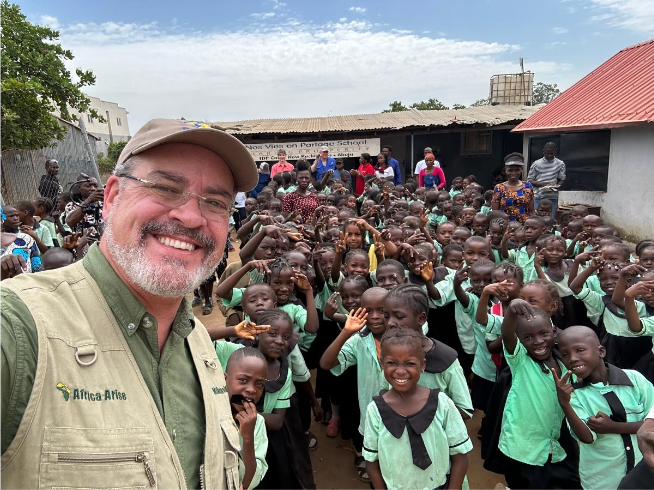
Lay a foundation for success
Leadership – Create a non-partisan, broad-based IDP Justice Task Force to lead this effort. Include those who have demonstrated commitment to peace and human rights. Perhaps welcome select international involvement. Build it across party lines, above reproach of corruption. Shame and shun those who politicize this for their own benefit.
Law Enforcement – Form an elite, national law-enforcement division modelled after the Untouchables in the US or Search Bloc in Columbia. Charge them with investigating, intervening and prosecuting continued violence and displacement, crimes and human rights violations against IDPs, and related official corruption. Task them with the security of all IDP communities.
IDP Census – Undertake a full census/survey of IDPs and encampments. Separate genuine IDPs from schemers. Collect not just statistics but also stories, and forensic evidence. Work to identify lands and properties destroyed or taken. Employ qualified IDPs to do this whenever possible.
Address immediate needs
Stop the violence and displacement – Mobilise forces to defend the innocent and permanently halt aggressors. Enforce zero tolerance for this violence. Deliver sure and swift capital punishment without the honours of the faith they’ve bastardised. Make them afraid, for a change.
Care for IDPs – Find where IDPs are and rush aid to them. Immediately release resources, and invite international agencies and NGOs, to care for IDPs as you find them. At minimum, they should begin with sufficient food, clothing, shelter, healthcare, sanitation, education and counseling. Help them connect with lost loved ones. Once their lives are stabilised, these services must grow, ultimately to full restoration.
Pursue long-term solutions
Investigate – Relentlessly work to uncover who is profiting from mining occupied lands. Prosecute and publicly shame them to the fullest. Confiscate their wealth for IDP restoration. The world shut down the trade of “blood diamonds” and can do the same for these “blood minerals.”
End foreign meddling – This crisis was triggered by callous foreign meddling in Nigerian elections. Prosecute for treason any candidate or official who enables or intentionally benefits from devious foreign involvement in Nigerian politics.
Secure borders – It is believed Illegal immigrants have “replaced” the displaced in some areas. Summarily deport them, and prosecute those responsible for facilitating this. Nigeria must care for her own citizens first.
Incentives – Provide incentives to encourage the business community and public to assist IDPs. Include grants or tax breaks for hiring IDPs, donating to legitimate IDP causes, etc.
Stamp out related corruption – Prosecute as an accomplice to murder any public official who has turned a blind eye to violence for politics or profit. Investigate any who may have personally benefited from aid intended for victims, allowed illegal immigrants to settle, permitted extraction of resources from lands of the displaced, suppressed any Nigerian’s religious liberties, or otherwise exacerbated the situation. (This includes past and present officials at all levels.)
Fairness – Stop rewarding terrorists while neglecting their victims. Enticed “repentance” is rarely real. The violent should face stern justice. Authentic reformation of repentant radicals who don’t have blood on their hands is a worthy goal, to be dealt with wisely and fairly.
Employment – Help IDPs who have lost their academic and professional credential to regain them. Provide training, help them find jobs, furnish basic resources necessary for gainful employment, and assist them in establishing new lives back in Nigerian society. Help them connect with coaching, investment/microfinance, legal and other support for starting new businesses.
Restoration or resettlement – Where possible and safety can be ensured, IDPs should be returned home and compensated for lost buildings and other assets. Where this is not possible, the government should grant large tracts of land and establish new communities to re-settle IDPs. Give those communities rights to the minerals underneath. Those who wish to relocate beyond this should be given direct assistance for a fresh start in the communities of their choice.
IDP children – Finding solutions is especially difficult for those orphaned by this tragedy, as well as for those born displaced. Special diligence must be paid to proper protection, education, life coaching and ongoing assistance for these remarkable survivors.
Fulani herdsmen – Perhaps Americans can best understand this issue by saying radical Fulani herdsmen are as if bands of Comanche Indians were today still roaming the US with herds of livestock, armed with AK-47s and steeped in radical Islam. It’s quite similar: Violent, nomadic bands are herding cattle around indifferent to private property, trampling subsistence crops, and killing anyone who gets in their way. Nigerians must accept that this is wholly incompatible with modern, civil society, and must be ended. How they do this is just as important as how they treat IDPs. Those guilty of murder should face justice, while every effort should be taken to help peaceful bands adjust favourably to life in the modern world. This could include grants of land and training in cattle ranching. Perhaps where they once grazed cattle, with the right agreements and implements, they may gather hay instead. As they say in America, good fences make good neighbors.
Restoration, not a welfare state – Policymakers must take care to ensure aid for IDPs is focused on justice, restoration, and practical aid to help them successfully re-integrate into society. It must not become a long-term entitlement program that creates government dependents.
Ensure ongoing balance in the federal government – Enforce the Federal Character Principle of fairness and equity in the distribution of public posts and socio-economic infrastructures. Respect traditions of sharing power among regions.
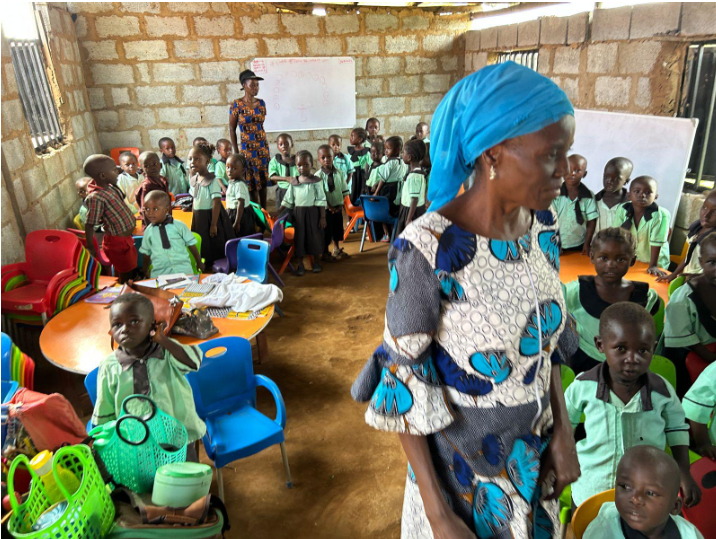
It is possible
Things are looking better. There is a tangible change in the atmosphere in Nigeria. Just the fact we can discuss these things openly now is like night and day from the previous administration. Yet Nigerians today are still being slaughtered, and millions still living displaced, fighting each day simply to survive.
On a Friday this past January, our leaders in New Kuchingoro were notified by a local police official they had to immediately evacuate, as that camp (and another nearby) would be bulldozed on Monday. Our team mobilised on every level – from organising student protests in the federal capital territory, to personally appealing to the Nigerian Minister of Information and even the chairman of the US House Committee on Foreign Affairs – and thankfully, one way or another, the demolition was stopped.
In April I tracked down this same police official face to face and asked him to explain himself. To justify his actions, he said, “There are no IDPs in the camps, they’re all criminals.” The same party line, the Big Lie propagated by the previous regime. And I think he wanted to believe it. Thankfully, I was able to convince him to work with us to undertake a census of the camp, to separate the multitude of legitimate IDPs from criminal interlopers, and he pledged not to destroy homes of any truly displaced.
This is the first taste of victory these people have had in a decade, and they were energised. But really, imagine that: Celebrating because the shanty next to the sewage ditch you’ve been forced to live in for ten years won’t be bulldozed this weekend. Nigeria can do so much better.
It is as if the nation right now is standing at the bank of a metaphorical Jordan River, looking across at an idyllic promised land. Will she forge ahead and seize a bright future, or turn around and sink once again to murky depths of division, fear and failure? A blessing or a curse.
Yes, healing the nation from this grievous wound will be a massive undertaking. But we know full well that nations are capable of widespread, coordinated mobilisation like this … in times of war. Why not achieve lasting peace? The objectives and consequences of this effort are no less vital to Nigeria’s future than if this were a full-scale enemy invasion or organized insurrection. Embrace this fight with the same patriotic duty and passion.
What will this cost? The real question is, does it matter? Nigeria will never rise to greatness until this humanitarian crisis is resolved. This can go down in history as Nigeria’s finest hour, a unifying inspiration for generations. Otherwise, turning a blind eye will be Nigeria’s darkest hour, reviled by history like America’s slavery or Germany’s holocaust.
Getting this right should be this government’s top priority, regardless of cost. It is an investment in the future that will yield dividends beyond measure.
Join us in calling the Nigerian government to seek justice and restoration for IDPs at www.IDPJustice.org.
Mike Arnold is the mayor of Blanco, Texas, USA. He is the founder and president, Africa Arise International. He can be reached via +1-210-286-4875 and [email protected]
Photo credit: Mike Arnold/Africa Arise
Views expressed by contributors are strictly personal and not of TheCable.
